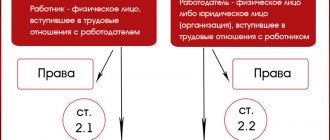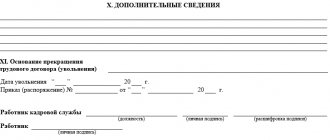Grounds for termination of an employment contract
The list of grounds for termination of an employment contract is given in Chapter 13 of the Labor Code of the Russian Federation (Articles 77 - 84 of the Labor Code of the Russian Federation). However, this list is not exhaustive, since Chapters 40 - 55 of Section XII of the Labor Code “Features of labor regulation for certain categories of workers” contain articles that provide additional grounds for termination of an employment contract with certain categories of workers.
General grounds for termination of an employment contract
The general grounds for termination of an employment contract are provided for in Art. 77 of the Labor Code of the Russian Federation, and they apply to all employees without exception. The grounds for termination of an employment contract are:
- 1) agreement of the parties (Article 78 of the Labor Code of the Russian Federation);
- 2) expiration of the employment contract (Article 79 of the Labor Code of the Russian Federation), except for cases where the employment relationship actually continues and neither party has demanded its termination;
- 3) termination of an employment contract at the initiative of the employee (Article 80 of the Labor Code of the Russian Federation);
- 4) termination of an employment contract at the initiative of the employer (Articles 71 and 81 of the Labor Code of the Russian Federation);
- 5) transfer of an employee, at his request or with his consent, to work for another employer or transfer to an elective job (position);
- 6) the employee’s refusal to continue working in connection with a change in the owner of the organization’s property, a change in the jurisdiction (subordination) of the organization or its reorganization, or a change in the type of state or municipal institution (Article 75 of the Labor Code of the Russian Federation);
- 7) the employee’s refusal to continue working due to a change in the terms of the employment contract determined by the parties (part four of Article 74 of the Labor Code of the Russian Federation);
 the employee’s refusal to transfer to another job, required for him in accordance with a medical report issued in the manner established by federal laws and other regulatory legal acts of the Russian Federation, or the employer’s lack of relevant work (parts three and four of Article 73 of the Labor Code of the Russian Federation);
the employee’s refusal to transfer to another job, required for him in accordance with a medical report issued in the manner established by federal laws and other regulatory legal acts of the Russian Federation, or the employer’s lack of relevant work (parts three and four of Article 73 of the Labor Code of the Russian Federation);- 9) the employee’s refusal to be transferred to work in another location together with the employer (part one of Article 72.1 of the Labor Code of the Russian Federation);
- 10) circumstances beyond the control of the parties (Article 83 of the Labor Code of the Russian Federation);
- 11) violation of the rules for concluding an employment contract established by this Code or other federal law, if this violation excludes the possibility of continuing work (Article 84 of the Labor Code of the Russian Federation).
Four groups of grounds for termination of an employment contract
The grounds for termination of an employment contract, listed in Part 1 of Article 77 of the Labor Code of the Russian Federation, can be conditionally divided into four groups depending on the circumstances that served as the reason for termination of the employment relationship. According to this criterion, the employment contract is terminated:
1) by mutual expression of the parties (Article 78 of the Labor Code of the Russian Federation);
2) at the initiative of one of the parties to the employment contract - the employee or the employer, including in connection with the transfer of the employee at his request or with his consent to work for another employer or transfer to an elective position (Article 72.1, 81 of the Labor Code of the Russian Federation);
3) in connection with circumstances that, for one reason or another, exclude the possibility of continuing the employment relationship, including:
- expiration of the employment contract (Article 79 of the Labor Code of the Russian Federation);
- due to circumstances beyond the control of the parties (Article 83 of the Labor Code of the Russian Federation);
- due to violations of the established rules for concluding an employment contract (Article 84 of the Labor Code of the Russian Federation);
4) in connection with the employee’s refusal for one reason or another to continue the employment relationship (Article 72.1, 75 of the Labor Code of the Russian Federation).
List of grounds for termination of an employment contract, provided for in Part 1 of Art. 77 of the Labor Code of the Russian Federation, is not exhaustive. The Labor Code or other federal laws may provide for other, additional grounds for termination of an employment contract.
Additional grounds for termination of an employment contract
Additional grounds for termination of an employment contract are applicable only to certain categories of employees and are established both by the Labor Code of the Russian Federation and by federal laws that regulate labor relations of certain categories of employees. For example:
- Article 278 of the Labor Code of the Russian Federation establishes additional grounds for terminating an employment contract with the head of an organization;
- Article 288 of the Labor Code of the Russian Federation states that an employment contract with a person working part-time can be terminated, in addition to the grounds provided for in the Labor Code of the Russian Federation and other federal laws, as well as in the case of hiring an employee for whom this work will be the main one;
- Article 336 of the Labor Code of the Russian Federation establishes additional grounds for termination of an employment contract with a teaching employee;
- Article 341 of the Labor Code of the Russian Federation establishes the grounds for termination of work at a representative office of the Russian Federation abroad.
In some cases, additional grounds for termination of an employment contract may be established not only by the law, but also by the employment contract, but in strict accordance with the labor legislation of the Russian Federation. Additional grounds for dismissal may be established in employment contracts only in relation to the following categories of employees:
- head of the organization (clause 3 of article 278 of the Labor Code of the Russian Federation);
- an employee working for an employer - an individual (Part 1 of Article 307 of the Labor Code of the Russian Federation);
- homeworker (Article 312 of the Labor Code of the Russian Federation);
- employee of a religious organization (Part 1 of Article 347 of the Labor Code of the Russian Federation).
Consequently, the parties to an employment contract have the right to independently establish other grounds for dismissal not provided for by law.
Nuances of other general grounds for dismissal
The remaining grounds for dismissal listed in paragraphs. 2, 5–9, 11 art. 77 of the Labor Code of the Russian Federation, are caused by the occurrence of a certain legal event or legally significant action, which, in turn, make further execution of the employment contract impossible. Each of them has its own specific application.
Here are just some of the nuances that you should pay attention to when dismissing an employee for these reasons:
- If after the expiration of the contract the employee continues to work, then it is considered extended for an indefinite period. In this case, the employer is deprived of the right to dismiss under Art. 79 Labor Code of the Russian Federation.
- Dismissal in connection with a transition to a new employer is carried out according to general rules and requires the employee to draw up a corresponding application.
- An employee’s refusal to work with the new owner of the organization, i.e., a new employer, as well as in connection with the reorganization or reassignment of the employer, is grounds for dismissal that can be applied to the manager, his deputies and the chief accountant.
- Dismissal when changing the terms of the employment contract is possible if the employee refuses to work in such conditions, as well as refuses other vacancies offered (Article 74 of the Labor Code of the Russian Federation).
- Termination of an employment contract under clause 9 of Art. 77 of the Labor Code of the Russian Federation provides for the organization to move beyond the administrative-territorial boundaries of the locality in which it is registered.
Termination of an employment contract
Termination of an employment contract at the initiative of the employee (at his own request)
Article 80 of the Labor Code of the Russian Federation establishes a general (unified) procedure and conditions for termination at the initiative of an employee of both a fixed-term employment contract and an employment contract concluded for an indefinite period.
The procedure and conditions for terminating an employment contract at the initiative of an employee include the following provisions:
- The reasons for dismissal do not matter . The right of an employee to terminate an employment contract before its expiration on his own initiative is not related to the presence of valid reasons. An employee has the right to terminate any employment contract at any time.
- The employee is obliged to give notice of dismissal . The employee is obliged to notify the employer of dismissal in writing no later than two weeks (the head of the organization warns the employer about this no later than one month in advance (Article 280 of the Labor Code of the Russian Federation); an employee who has entered into an employment contract for a period of up to two months, as well as an employee employed for seasonal work, the employer is warned three calendar days in advance (Articles 292, 296 of the Labor Code of the Russian Federation)). The employee has the right to notify the employer of termination of the employment contract and for a longer period of time. Two weeks (a month, three days) is the minimum period within which an employee is obliged to notify the employer of his desire to terminate the employment relationship.
- Resignation form . The resignation letter must be in writing. An employee's oral statement about termination of an employment contract cannot be the basis for the employer to issue a corresponding dismissal order.
- An employment contract can be terminated before the expiration of the notice period . By agreement between the employee and the employer, the employment contract can be terminated before the expiration of the established notice period. In this case, the basis for dismissal will be the employee’s own desire, and not the agreement of the parties provided for in paragraph 1 of Part 1 of Art. 77 Labor Code of the Russian Federation. If the parties have agreed to terminate the employment contract before the expiration of the established warning period, the employment contract is terminated on the basis of clause 3, part 1, art. 77 of the Labor Code of the Russian Federation on a day determined by the parties. The parties’ agreement on early termination of the employment contract must be expressed in writing, for example in the form of an employer’s resolution on the employee’s resignation letter.
- If the employer does not agree to terminate the contract before the expiration of the notice period . If the employer does not agree to terminate the employment contract before the expiration of the notice period, the employee is obliged to work for the established period. An employee who stops work early may be fired for absenteeism. The employer also does not have the right to dismiss an employee before the expiration of two weeks after he submits an application for termination of the employment contract, if the application does not indicate the date of dismissal, or before the expiration of the period specified in the application.
- If the employee’s resignation is due to the impossibility of continuing his work . If the employee’s application is due to the impossibility of continuing his work (enrollment in an educational institution, retirement, or the presence of other valid reasons due to which the employee cannot continue to work, for example, sending a husband (wife) to work abroad, to a new place of duty), and Also, in cases of established violation by the employer of labor legislation and other regulatory legal acts containing labor law norms, local regulations, the terms of a collective agreement, agreement or employment contract, the employer is obliged to terminate the employment contract within the period specified in the employee’s application. It is necessary to keep in mind that these violations can be established, in particular, by bodies exercising state supervision and control over compliance with labor legislation, trade unions, labor dispute commissions, and the court (clause 22 of the Resolution of the Plenum of the Armed Forces of the Russian Federation dated March 17, 2004 N 2).
- Letter of resignation during a period of temporary incapacity for work, while on vacation, or on a business trip . The employee has the right to notify the employer of dismissal in advance in writing, and it does not matter whether the employee is at work, on vacation or sick. All time from the date of filing an application for resignation at one's own request is counted towards the notice period for dismissal.
- Dismissal of an employee during his illness . The employee's illness does not suspend the period after which the employee is subject to dismissal. Dismissal of an employee at his own request in accordance with his application is also possible during a period of temporary incapacity for work, since the initiative for dismissal comes from the employee, and not from the employer.
- Verification of the fact that the employee was forced to submit a resignation letter . Termination of an employment contract at the initiative of an employee is permissible in cases where filing a letter of resignation was his voluntary expression of will. If the plaintiff claims that the employer forced him to submit a resignation letter of his own free will, then this circumstance is subject to verification and the responsibility to prove it rests with the employee (subparagraph “a”, paragraph 22 of the Resolution of the Plenum of the Armed Forces of the Russian Federation dated March 17, 2004 N 2).
- The employee has the right to withdraw his resignation letter before the expiration of the notice period . Based on the contents of Part 4 of Art. 80 of the Labor Code of the Russian Federation and Part 4 of Art. 127 of the Labor Code of the Russian Federation, an employee who has warned the employer about termination of an employment contract has the right to withdraw his application before the expiration of the warning period (and when granting leave with subsequent dismissal - before the start day of the leave), and dismissal in this case is not carried out, provided that his place is replaced by another employee has not been invited in writing, who, in accordance with the Code and other federal laws, cannot be refused to conclude an employment contract (for example, by virtue of part four of Article 64 of the Labor Code of the Russian Federation, it is prohibited to refuse to conclude an employment contract to employees invited in writing to work in transfer from another employer, within one month from the date of dismissal from the previous place of work). If, after the expiration of the notice period, the employment contract has not been terminated and the employee does not insist on dismissal, the employment contract is considered continued (part six of Article 80 of the Labor Code of the Russian Federation) (see subparagraph “c”, paragraph 22 of the Resolution of the Plenum of the Armed Forces of the Russian Federation dated March 17, 2004 N 2).
- If the employee does not insist on dismissal .. If, after the expiration of the notice period, the employment contract is not terminated and the employee does not insist on dismissal, the employment contract is considered continued. However, no additional agreements are required in this regard.
Termination of an employment contract at the initiative of the employer
Article 81 of the Labor Code of the Russian Federation provides a list of grounds for termination of an employment contract at the initiative of the employer. It contains both grounds that apply to all employees, and grounds that apply only to a certain category of workers.
Part 1 of Article 81 of the Labor Code of the Russian Federation contains specific grounds for termination of an employment contract at the initiative of the employer. An employment contract can be terminated by the employer in the following cases:
- 1) liquidation of an organization or termination of activities by an individual entrepreneur;
- 2) reduction in the number or staff of employees of an organization or individual entrepreneur;
- 3) the employee’s inconsistency with the position held or the work performed due to insufficient qualifications confirmed by certification results;
- 4) change of owner of the organization’s property (in relation to the head of the organization, his deputies and the chief accountant);
- 5) repeated failure by an employee to perform labor duties without good reason, if he has a disciplinary sanction;
- 6) a single gross violation of labor duties by an employee: a) absenteeism, that is, absence from the workplace without good reason throughout the entire working day (shift), regardless of its duration, as well as in the case of absence from the workplace without good reason more than four hours in a row during a working day (shift);
- b) the appearance of an employee at work (at his workplace or on the territory of an organization - employer or facility where, on behalf of the employer, the employee must perform a labor function) in a state of alcohol, narcotic or other toxic intoxication;
- c) disclosure of secrets protected by law (state, commercial, official and other) that became known to the employee in connection with the performance of his job duties, including disclosure of personal data of another employee;
- d) committing at the place of work theft (including small) of someone else's property, embezzlement, intentional destruction or damage, established by a court verdict that has entered into legal force or a decision of a judge, body, official authorized to consider cases of administrative offenses;
- e) a violation by an employee of labor safety requirements established by the labor safety commission or the labor safety commissioner, if this violation entailed serious consequences (industrial accident, breakdown, catastrophe) or knowingly created a real threat of such consequences;
 the commission by an employee performing educational functions of an immoral offense incompatible with the continuation of this work;
the commission by an employee performing educational functions of an immoral offense incompatible with the continuation of this work;What disciplinary offenses still constitute a reason for dismissal?
- repeated violations of discipline - each such violation must be documented;
- absenteeism – absence from work for more than 4 hours without a confirmed valid reason;
- being drunk at work;
- theft in the workplace, as determined by an audit;
- immoral behavior of an employee - if the scope of his activity is related to educational or teaching work.
All employee responsibilities must be specified in a contract or internal document of the organization, for example, working hours, dress code, as well as company rules, with reference to legislative acts. Anything that is not recorded in writing cannot become a reason for dismissal.
For example, an employee’s failure to perform work or its unsatisfactory result cannot be considered a violation if their performance is not specified in the employment agreement or does not correspond to the worker’s professional qualifications.
Only a detailed job description can help the employer prove that the employee did not fulfill his duties.
Dismissal is lawful if:
- its reason complies with the norms of the Labor Code of the Russian Federation;
- all procedures for documenting dismissal were followed.
Recommended publications
Judicial practice of dismissing an employee at the initiative of the employer
On the judicial practice of considering disputes arising in connection with the dismissal of an employee on the initiative of the employer, see the review “Dismissal of an employee under Article 81 of the Labor Code of the Russian Federation on the initiative of the employer. Arbitrage practice". This review of judicial practice contains judicial acts issued based on the results of consideration of labor disputes between an employee and an employer on the legality of termination of an employment contract at the initiative of the employer, reinstatement at work, changing the wording of dismissal, recovery of wages for the period of forced absence, collection of compensation for moral damage.
Samples of statements of claim for reinstatement at work and recovery of wages during forced absence
- Statement of claim for reinstatement at work and recovery of wages during forced absence
- Statement of claim for reinstatement at work, recovery of wages for forced absence and compensation for moral damage
- Statement of claim for the recovery of monetary compensation for delayed payment of wages not paid on the day of dismissal










